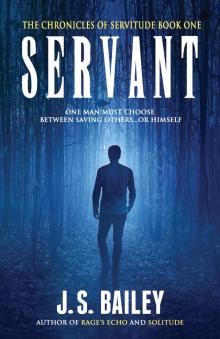- Home
- J. S. Bailey
Rage's Echo
Rage's Echo Read online
RAGE’S ECHO
Copyright © 2013, 2015, 2017 J.S. Bailey
All rights reserved. Except as permitted under the U.S. Copyright Act of 1976, no part of this publication may be reproduced, distributed, or transmitted in any form or by any means, or stored in a database or retrieval system, without prior written permission of the publisher.
This book is a work of fiction. The characters, incidents, and dialogue are drawn from the author’s imagination and are not to be construed as real. Any resemblance to actual events or persons, living or dead, is entirely coincidental.
Published by Open Window
an imprint of BHC Press
Library of Congress Control Number:
2017938457
Print edition ISBN numbers:
ISBN-13: 978-1-946848-10-9
ISBN-10: 1-946848-10-7
Also available in eBook
Visit the author at:
www.jsbaileywrites.com &
www.bhcpress.com
Book design by Blue Harvest Creative
www.blueharvestcreative.com
NOVELS
The Land Beyond the Portal
Servant
The Chronicles of Servitude, Book One
Sacrifice
The Chronicles of Servitude, Book Two
Surrender
The Chronicles of Servitude, Book Three
COLLECTIONS
The Land Beyond the Portal
MULTI-AUTHOR ANTHOLOGIES
Through the Portal
Call of the Warrior
In Creeps the Night
A Winter’s Romance
Tales by the Tree
For Nathan, whose patience, love,
and devotion deserve an award.
A sound awakened him from a restless slumber.
He stared at the ceiling for a moment. Of course, the sound had been the figment of some fading dream. It was foolish to worry. Even if he hadn’t imagined the sound, it was probably nothing more than a vehicle driving by outside or the house settling on its foundation. Children became frightened by these things, not him. The years of lying awake at night and calling for his mother to come save him from the monsters in the dark had long since passed away.
He closed his eyes with the hopes of drifting back to that world where the troubles of the daytime melted into oblivion, but suddenly a floorboard in the room emitted a low creak as if someone were standing upon it.
He lifted his head and peered out into the room. At first he could see nothing, but when his eyes adjusted to the darkness, he saw them.
Five—no, six—silhouettes stood in a semicircle around the foot of his bed. The moonlight filtering through the drapes made them blacker than the surrounding shadows.
Before he could respond to the intrusion, he felt a sharp twinge on the upper part of his left arm. He yelped in surprise and rolled onto his side, only to see that a seventh silhouette stood inches from the edge of his bed. Two pinpricks of reflected light floated in the air. Eyes.
His pulse quickened. “What do you want from me?” he croaked, even though he already knew the answer.
It was so quiet that he swore he heard blood rushing through his veins as anxiety pushed his heart to the limit. Sweat began to run down his forehead. Why wouldn’t they just answer him?
Perhaps this was some new kind of psychological warfare: standing in the dark and waiting in silence until their victim went mad.
It might prove effective.
He tried to sit up and reason with them, but his body felt as though it had turned to rubber. Was he drugged?
The thing next to him jerked its head to the side. Three of the other silhouettes broke away from their group. One joined the first silhouette on the left. The remaining two came up to the right. He was surrounded. No way to escape, unless a guardian angel tucked him under its wings and carried him away to safety.
Everything was still.
But he could hear them breathing.
He didn’t dare close his eyes. God, grant me the serenity…
Four sets of arms grabbed him suddenly and flipped him over onto his stomach. His own arms were wrenched behind him, and his wrists were crossed and held in place by unseen fingers. He could hear duct tape being torn off a roll. He writhed around to break free from their grasp. It was no use. His hands were bound behind him.
One of the silhouettes at the foot of the bed let out a choked sob.
Cloth was placed over his head (a sack?), and the phantoms wrapped more tape around his ankles and lifted him from the bed. He was limp as a rag doll. Whatever they had drugged him with was working quite well.
The phantoms made no effort to ease his discomfort. They jostled him around as if he were a bag of refuse they were hauling away to a bin. His head banged against the wall as they carried him down the stairs. He cried out to deaf ears.
He heard a squeak. Felt a gust of air. They were taking him outside. Now, crickets. Chirping in the yard. An engine idled close by. A car door opened, and he was shoved onto a sticky leather seat. A radio was playing some Led Zeppelin song, “Dazed and Confused.” How fitting.
The phantoms climbed in with him. The one on his right smelled like Old Spice.
Doors slammed closed. Seatbelts clicked. Someone killed the radio.
The car lurched as it moved away from the curb.
Tears stung his eyes. This couldn’t be happening. It had to be a dream. A nightmare. His own imagination torturing him while he slept.
But one could not imagine the terror that crippled him or the coarse fabric that scratched against his face with each of his movements or the throbbing in his head where he’d hit it on the wall.
He knew these feelings were real.
He also knew that he would not end this night alive.
Wayne Thompson was sitting at the wrought-iron patio table on his deck and frowning at the spreadsheet he had pulled up on the screen of his computer when his cousin Sidney Miller stepped outside to have a smoke.
He looked up when he heard the soft footsteps of her approach.
Sidney stood in the small realm of light provided by the porchlight mounted above the screen door. The single bulb brought out the shine in her red hair, which she had tied back into a bun and adorned with a pair of decorative chopsticks that crisscrossed in an X shape. Wayne’s own hair was as dark as black coffee. He and Sidney hardly resembled each other at all.
“Nice out here, isn’t it?” she said without enthusiasm. She slid a cigarette from its box and stuck it between her lips. She patted the pockets of her black skinny jeans. “Crap, I left my lighter in the house. Can you toss me that one?”
Wayne had lit a citronella candle to ward off any mosquitoes that might still be hanging around this time of year and left the Bic lighter lying on the table. He picked it up and threw it in Sidney’s direction without looking. It hit the wooden planks of the deck with a thunk.
“What’s the matter?” she asked him, bending to snatch the lighter from the ground.
“You know those things are going to kill you,” he said.
She shrugged and lit the cigarette anyway—a Camel Menthol. Wayne returned his attention to the computer screen, where their unpleasant financial situation was laid bare in a grid of columns and rows. “Would it upset you if I bumped up your rent?”
Sidney was at his side in an instant. Bad news could always perk her up. She leaned in to get a better look at the spreadsheet.
Wayne could see its reflection in the lenses of her glasses.
“Oh.” She straightened a little. “I thought you said you have a fixed-rate loan.”
“I do. The increase is from my homeowner’s insurance.”
“That stinks.”
It didn’t stink nearly as much a
s the smoke she was puffing out into the night air, but he didn’t tell her that. At least she had the tact not to do it in his house.
“Would an extra twenty a month be too much?”
“It beats the alternative.” She went and leaned against the wooden railing that surrounded most of the deck and gazed vacantly out into the yard. Wayne didn’t know what thoughts were running through her mind. He wouldn’t ask her.
Oh, well. Sidney could stay out here as long as she wanted, but he was going to go inside before his lungs started filling up with second-hand smoke.
He snapped the lid of his laptop closed and blew out the candle.
“Going in?” Sidney asked. There was a melancholic note in her voice that made him feel guilty for leaving her.
“If I stay out here, I’m going to develop black lung disease.”
“Jerk.”
He smiled. “Not me.” Using the table for support, he pulled himself to his feet. The shift in position made his calves itch beneath his ankle-foot orthotics. It didn’t bother him as much as it used to. Some things he’d learned to ignore. Like the unwanted stares.
He tucked the laptop under his arm. It hadn’t rained in about two months, and if Sidney tossed the smoldering cigarette butt out into the yellowed grass, it would probably ignite the lot in about two seconds. “Try not to catch the yard on fire.”
Sidney made a snorting noise that might have been a laugh.
“No promises. But maybe if this place burns to the ground, that homeowner’s insurance you’ve got will let you build a mansion here instead.”
“Yes, because a foreclosed mansion is exactly what I need.” He limped across the deck. People referred to his way of walking as a “scissors” gait, which he’d always thought was dumb because it made him sound like he was a giant, anthropomorphic pair of shears. Wayne Scissorlegs. The very thought made him shudder.
He paused for a moment in the mudroom to glance back at his cousin as she took a seat at the patio table and drew her knees to her chest. Her face was long, and for a moment she looked much older than her nineteen years. Her shoulders began to quake. She was crying again.
Seeing her like this put a knife through his heart. He was about as adept at offering sympathy as he was at doing the triathlon—and he couldn’t do that at all.
Sidney’s mother had been the one they all turned to when they needed words of encouragement or a shoulder to cry on. But Marjorie Miller was dead. Brain cancer struck her down when she was only forty. That was a year and a half ago. It felt like an eternity.
Marjorie had been a mother to him, too. Even though she had been only twelve years his senior, and even though she knew about the awful thing he’d done, she’d taken him in and loved him just as much as her own children. That had taken guts, he supposed. The two foster families he’d briefly lived with subsequent to the awful thing had feared him so much that he’d only stayed with them for a couple months each. Marjorie had been patient with him, though. She’d taught him that anger and hatred weren’t going to fix what had happened.
Sidney began to cheer up when she moved in with him after her mother’s death. Since Marjorie and Drew Miller became Wayne’s legal guardians when he was fourteen years old, he and Sidney felt more like siblings than cousins, and moving in with her “brother” turned out to be a much-needed change of scenery for her.
Yet Sidney would still sink into a deep depression every month or so. Wayne wished she would find the strength within herself to move on and heal.
After depositing the computer on a clean section of the Formica countertop, Wayne shuffled over to the refrigerator and grabbed a Mike’s Hard Lemonade out of one of the crisper drawers. He pried off the cap and took a long, satisfying gulp. Alcohol in moderation was tonic for the soul.
He heard the squeak-click of the back door opening and closing. Sidney walked into the kitchen and threw the remains of her cigarette into the corner wastebasket. Her eyes were rimmed in red.
“I thought Jessica was coming over tonight,” she said. “Do you think something could have happened to her?”
“No, she’s fine. She’s packing.” At least he hoped she was.
Sidney frowned. “What do you mean, packing? She’s not going on vacation, is she?”
Wayne laughed and took another sip from the bottle. “I wouldn’t call it that.” Their good friend Jessica Roman-Dell had recently lost her job as a gas station clerk. She’d had enough money in savings to last her two weeks, and those two weeks had come and gone without her finding another source of income. She called Wayne that morning in tears to tell him that she couldn’t afford the rent on her apartment anymore. (She had declined his suggestion to go work the street corners downtown for some extra cash.) There was only one thing he could do to help her.
“I hope you don’t mind having a roommate,” he said.
A look of comprehension appeared on her face. “Oh. That kind of packing.”
“She told me that if you don’t want her in your room, she’d take the basement or junk room instead.”
“Yeah, right. She hasn’t seen the spiders.” She rolled her eyes. “Packing. Why is it that I have such a hard time picturing that?”
Wayne finished the Mike’s and set the bottle in the sink. “I haven’t the slightest idea.”
JESSICA ROMAN-DELl was not packing.
Sure, she had started packing, but then Ellen Shoushanian called her on the phone and asked Jessica if she wanted to come investigate the woman’s house that evening.
Jessica, sitting in a cleared island amid a sea of her scattered belongings, looked from the mound of folded clothing she had been piling into a box to the cat-shaped clock on the wall. It was five-thirty.
“I can be there at six,” she said.
Now it was nearing ten o’clock, and Jessica began to pray that something interesting would happen before she died of boredom in Vince and Ellen Shoushanian’s moldy basement.
Ellen’s words from hours earlier drifted through her thoughts.
Things are constantly moving around by themselves whenever Vince and I’ve gone out. Would you believe I found the TV remote in the back of the deep freeze one time? Vince swears he had nothing to do with it. But you know, nothing’s as odd as the time we came home from church one morning and the spice rack was sitting in the middle of the stairs.
Jessica had considered asking if Alzheimer’s might be an explanation for these so-called misplaced objects. The Shoushanians were only in their sixties, but you never knew when someone’s mind might start to go.
Misplaced objects weren’t the only concerns in the Shoushanian household. Vince claimed to have seen the apparition of a young man two or three times, and both of them swore they had heard lively conversations coming from empty rooms late at night.
Loud radios in passing cars, Jessica had thought, but again she’d remained silent. She had an open mind. If there was a chance she might encounter a ghost, she was willing to take it.
Jessica shivered. She shouldn’t have worn flip-flops on this outing. The day had been warm, but the dampness of the basement chilled her. A pipe was leaking somewhere close by. The endless drip-drip-drip made her think of Chinese water torture, and she yearned for a ghost to appear to distract her from the sound.
She picked up her thermal imaging camera and panned the room for the umpteenth time, looking for any anomalies in temperature that might indicate the presence of a spirit. The only yellow-orange heat signatures she could see on the tiny screen came from the water heater and some pipes that branched off from it in different directions. She sighed and stared up at the cobwebbed rafters.
“If you’re really here,” she said, “it would be great if you could come out and say hello.”
Silence answered her, as it usually did. Investigations like this were frustrating, especially when you sat and sat and sat for half the night without one blessed thing happening that could be ascribed to the spirits she longed to exist. Sometimes she wondered why
she kept at it at all. It was probably the same reason why gambling addicts lost entire paychecks at the craps tables on Saturday nights and kept coming back for more: one night of triumph would overshadow a hundred of failure.
A cricket started chirping off in the corner. Like the leaking pipe, Jessica tried to ignore it.
“Are you just being shy?” she asked. “I can be shy too sometimes. But I am a lot more outgoing than I used to be. Working at the gas station for four years helped a lot with that. Did you used to work somewhere?”
More silence.
She lifted the thermal imaging camera from her lap again and gave the room another sweep. Nada.
This was starting to look like one big waste of time, just like her parents always told her. She could have been at home doing something more productive, like eating microwaveable burritos and watching ancient reruns of The Carol Burnett Show—and packing.
It was surprising that her parents cared anything about her hobby, even if in a negative way. The two of them were so caring that they forgot to call her on her last birthday to congratulate her for making it to twenty-one all in one piece. A week later they mailed her a card containing a check for twenty dollars. She used the money to buy more frozen burritos and counted out the remaining change to put in her gasoline fund.
Jessica spoke for a third time. “Can you tell me what your name is?”
If the ghost had a name, she couldn’t hear it. She continued.
“My name’s Jessica Roman-Dell. A lot of people ask me what kind of last name that is, and I just tell them that a million years ago a Roman married a Dell and they got in a huge fight about what last name their kids would have, and neither of them would give in, so in the end they just combined the two. They’d have called the kids Dell-Roman instead, but that sounds stupid. My dad probably knows the real origin of the name, but I never asked him. I don’t get along with my parents very well. Did you get along with your parents?”

 Dalton Kane and the Greens
Dalton Kane and the Greens Sacrifice
Sacrifice Servant
Servant Rage's Echo
Rage's Echo Ordinary Souls
Ordinary Souls Surrender
Surrender